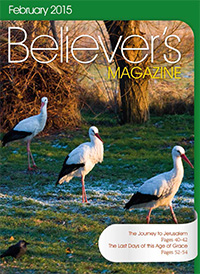Can you explain 1 Timothy 1.20?
The reference to delivering to Satan is associated with the Apostle Paul on two occasions (1 Corinthians 5.5 and 1 Timothy 1.20). Both passages refer to very serious matters in the apostolic period of the church for which there is an extreme form of discipline. The differences between these chapters are important. In 1 Corinthians 5 the problem is moral wrong, whereas the problem in the Timothy passage is doctrinal wrong. 1 Corinthians 5 has the future in view, "That the spirit may be saved in the day of Jesus Christ" (v.5), but in 1 Timothy 1.20 the present is in view. In 1 Corinthians it is an assembly act with which Paul associated himself, but in 1 Timothy it is an apostolic act. The objective in the discipline in each case is different. In 1 Corinthians 5 it is for the destruction of the flesh; in the other it is "that they may learn not to blaspheme". The word "learn" here is not by the impartation of knowledge, but rather to learn by way of chastening, correction and even severe discipline. In both cases the discipline is remedial. It is important to remark that God may allow Satan to touch the flesh but not to touch the spirit of a believer.
What then does it mean to deliver to Satan? It involves serious discipline by putting the offender into the sphere of the world. The world is the place where Satan as the god of this world rules, but by contrast the assembly is where God rules. Paul with apostolic power takes this action. We do not believe that in our day any individual can perform such a serious act. It is the assembly that excommunicates and not any one individual. The two men mentioned had been teaching slanderous doctrine against God. The point must not be overlooked that the assembly is a shelter for believers in this world. There is a within and a without of the assembly. An assembly should be a sphere of blessing, comfort, protection and spiritual help for the believer in this world.
John J Stubbs
Question 1. In the Old Testament, musical instruments, such as the timbrel and harp, were used and encouraged, particularly in the Psalms. Are these still to be used and, if not, where does Scripture teach that they should be set aside?
Question 2. If clapping of hands is allowed in the Psalms (Ps 47.1), why do some assemblies look down on it and refuse to let it be used in the meetings?
There is no New Testament Scripture that would sanction the use of musical instruments in the gatherings of the Lord's people in this present church age. To quote the Old Testament as authority for the use of any musical instrument is inadequate ground. If we were to introduce the timbrel (a percussion instrument) or the harp (a stringed instrument) of Judaism into New Testament service, then we would have as much authority for bringing in, for example, the incense and the vestments of the same system.
The use of music belonged to the Old Testament period when God was dealing with Israel as a nation. The ritual of that day has given way to the reality we now have in Christ. We have, by the grace of God, been brought on to entirely different ground in this present dispensation. The priests with their special garments, the earthly sanctuary, the literal animal sacrifices, the music, the incense and the altars have all been replaced with New Testament spiritual counterparts. The New Testament epistles make this abundantly clear, especially the Epistle to the Hebrews which was initially addressed to Hebrews "to encourage them to cease being Hebrews".
It is true that the word rendered "sing" in 1 Corinthians 14.15 has, for its primary meaning, "to twitch, or twang, to play a stringed instrument with the fingers". However, the context of 1 Corinthians 14.15 rules out all thought of using a musical instrument. The singing is to be "with the spirit" (the reference is to one's own spirit as moved by the Spirit of God) and "with the understanding also" - neither of which qualities is found in a timbrel or a harp!
The principles set out in answer to the first question apply equally well in answer to the second. The clapping of hands, as an expression of praise to God and joy in His presence, is a physical activity inappropriate, in the mind of the respondent, to this age of the Spirit.
David E West









